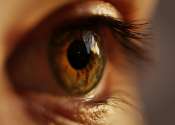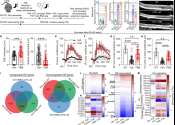Last update:
Ophthalmology news
Neuroscience
New research shines light on highly sensitive human visual system
Researchers at the University of Helsinki have made a breakthrough in understanding what neural mechanisms allow the extreme sensitivity of human vision in darkness. The new research shows that humans can perceive minute ...
7 hours ago
0
22
Neuroscience
Nerve regrowth findings could lead to a potential treatment for a common cause of blindness
Injured optic nerves can regrow toward the brain if treated properly, University of Connecticut scientists report in the September issue of Experimental Neurology. The findings in mice could lead to a potential treatment ...
12 hours ago
0
31
Sleep apnea associated with age-related macular degeneration
A Center for Eye Research Australia study has linked low levels of oxygen in the blood overnight—a common sign of obstructive sleep apnea—with wet age-related macular degeneration.
14 hours ago
0
0

Experimental study shows connection between COVID infection and age-related blindness
An experimental study in mice shows that SARS-CoV-2 infection can damage the retinas, with long-term implications for vision. Post-acute sequelae of SARS-CoV-2 infection include various neurocognitive symptoms, suggesting ...
Dec 3, 2024
0
22

DNA damage is key factor in age-related macular degeneration, study finds
A research team co-led by the University of California, Irvine has discovered that accumulated DNA damage in the retina is a key contributor to age-related macular degeneration and that targeting specific retinal cell types ...
Dec 3, 2024
0
0

Research reveals hidden visual deficits and neural pathway alterations in mild TBI patients
Vanderbilt University Medical Center-led research reveals subtle changes in the visual pathways of individuals with chronic mild traumatic brain injury (TBI), even when standard eye examinations show no abnormalities. These ...

How to avoid eye infections—and what to do if you get one
Sir Elton John recently revealed on ABC's Good Morning America that he lost the sight in his right eye after suffering from an eye infection. With poor vision in his left eye too, John said. "It's been four months now since ...
Dec 1, 2024
0
15

3D-printed hydrogel enables continuous drug delivery via contact lens
The next time you need to take a prescription drug, taking it might be as easy as putting on a contact lens, thanks to a new discovery made by University of Waterloo researchers.
Nov 29, 2024
0
39

Preclinical tests show mRNA-based treatments effective for blinding condition
A preclinical study by Mass Eye and Ear investigators showed that a novel mRNA-based therapy may be able to prevent blindness and scarring from proliferative vitreoretinopathy (PVR) following a retinal detachment repair or ...
Nov 27, 2024
0
27

Ex-eye bank workers say pressure, lax oversight led to errors
William Lopez remembers clearly the day in June 2017 when he says he was asked to call the spouse of a college friend who had just died and ask for her eyes.
Nov 27, 2024
0
0

Experiments show nerve cells of blind mice retain their visual function
The retina is often referred to as an "outpost of the brain"—after all, important steps in visual signal processing do not take place in the cerebrum, but in the nerve cells in the eye. When light falls on the retina, sensor ...
Nov 26, 2024
0
35

Early-stage trial finds stem cell therapy for retinitis pigmentosa is safe
A team of UC Davis Health researchers has shown that CD34+ stem cells can be safely administered into retinitis pigmentosa (RP) patients' eyes and may offer therapeutic benefits. The phase 1 trial also confirmed that these ...
Nov 26, 2024
0
2

Seeing the future: How expectations guide eye movements
Eye movements are the human body's fastest and most common actions: We actively shift our gaze about two to three times per second to gain information about our environment. Where we look determines what we learn about the ...
Nov 25, 2024
0
0

New model of neuronal circuit provides insight on eye movement
Working with week-old zebrafish larva, researchers at Weill Cornell Medicine and colleagues decoded how the connections formed by a network of neurons in the brainstem guide the fishes' gaze.
Nov 22, 2024
0
65

Experts define elements of brain-based visual impairment in children
Experts convened by the National Institutes of Health (NIH) have identified five elements of a brain-based condition that has emerged as a leading cause of vision impairment starting in childhood in the United States and ...
Nov 19, 2024
0
0

Blood pressure variability linked to accelerated vision loss in glaucoma
University of California, San Diego-led research suggests that long-term variability in blood pressure is associated with accelerated worsening of peripheral vision due to the progression of glaucoma.

Study shows association between climate change and eye maladies
Clinical visits by patients suffering ocular surface eye conditions more than doubled during times when ambient particulate matter from air pollution was in the atmosphere, signaling a possible association between climate ...
Nov 16, 2024
0
0

Alternative experimental gene therapy restores hearing, boosts vision in tests
Harvard Medical School researchers have taken another decisive step in their efforts to develop a gene therapy for people with Usher syndrome type 1F, a rare condition that causes deafness and progressive blindness.
Nov 15, 2024
0
23

Australian researchers discover 101 genetic regions linked to cataract risk
QIMR Berghofer researchers have made a groundbreaking discovery in the largest ever genetic study on cataracts, analyzing the DNA of more than 950,000 people.
Nov 14, 2024
0
0

Shortsightedness is on the rise in children. There's more we can do than limit screen time
Myopia in children is on the rise. The condition—also known as shortsightedness—already affects up to 35% of children across the world, according to a recent review of global data. The researchers predict this number ...
Nov 13, 2024
0
0

Human vision restored by stem cell replacement in regenerative medicine breakthrough
Researchers led by Osaka University in Japan have conducted the first human trial using induced pluripotent stem-cell-derived corneal epithelium to treat limbal stem cell deficiency, offering a potential new avenue for restoring ...

Treatment to preserve sight in children with rare genetic disorder shows promise in clinical trial
A new treatment that could prevent blindness in children with the CLN2 type Batten disease has been trialed by clinicians and researchers at UCL and Great Ormond Street Hospital (GOSH).
Nov 12, 2024
0
0

Animated movie characters with strabismus are more likely to be villains, study finds
Strabismus, a misalignment of the eyes that occurs especially in children, has no bearing on intelligence or personality, but animated movies tend to use the condition to signify a villainous, dopey, or clumsy character, ...
Nov 12, 2024
0
0

Few patients receive AI-assisted screening for diabetic retinopathy despite its promise, study finds
A team of ophthalmology researchers at Stanford University, working with a colleague from New York University School of Medicine, has found that despite promise for detecting diabetic retinopathy, few patients are given AI-assisted ...

Genetic testing rate lower for Blacks with inherited retinal diseases
The genetic testing rate is lower for Black than non-Hispanic White patients with inherited retinal diseases (IRDs), according to a study published online Nov. 7 in JAMA Ophthalmology.
Nov 8, 2024
0
0













































